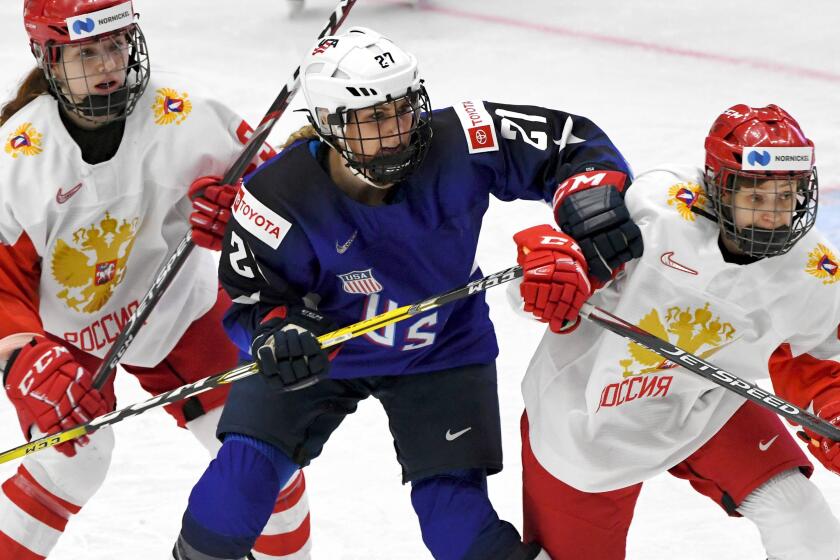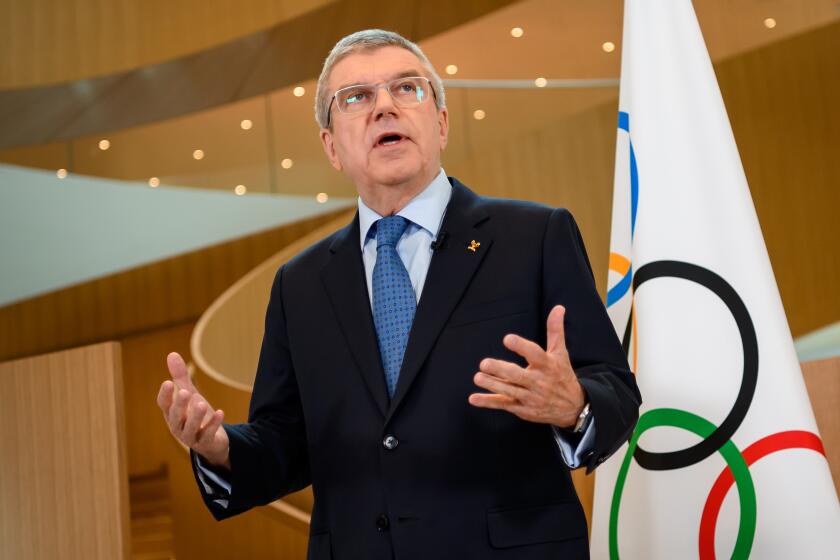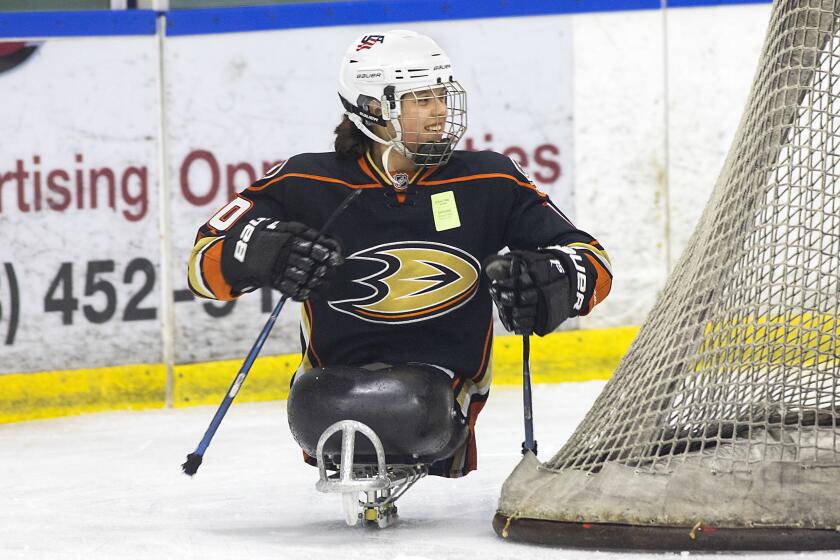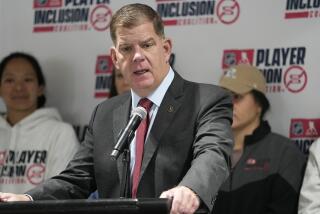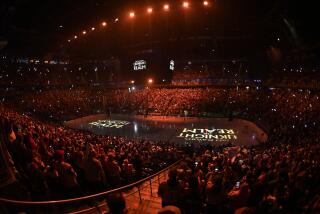NHL observations: Coronavirus starting to have major impact on hockey world
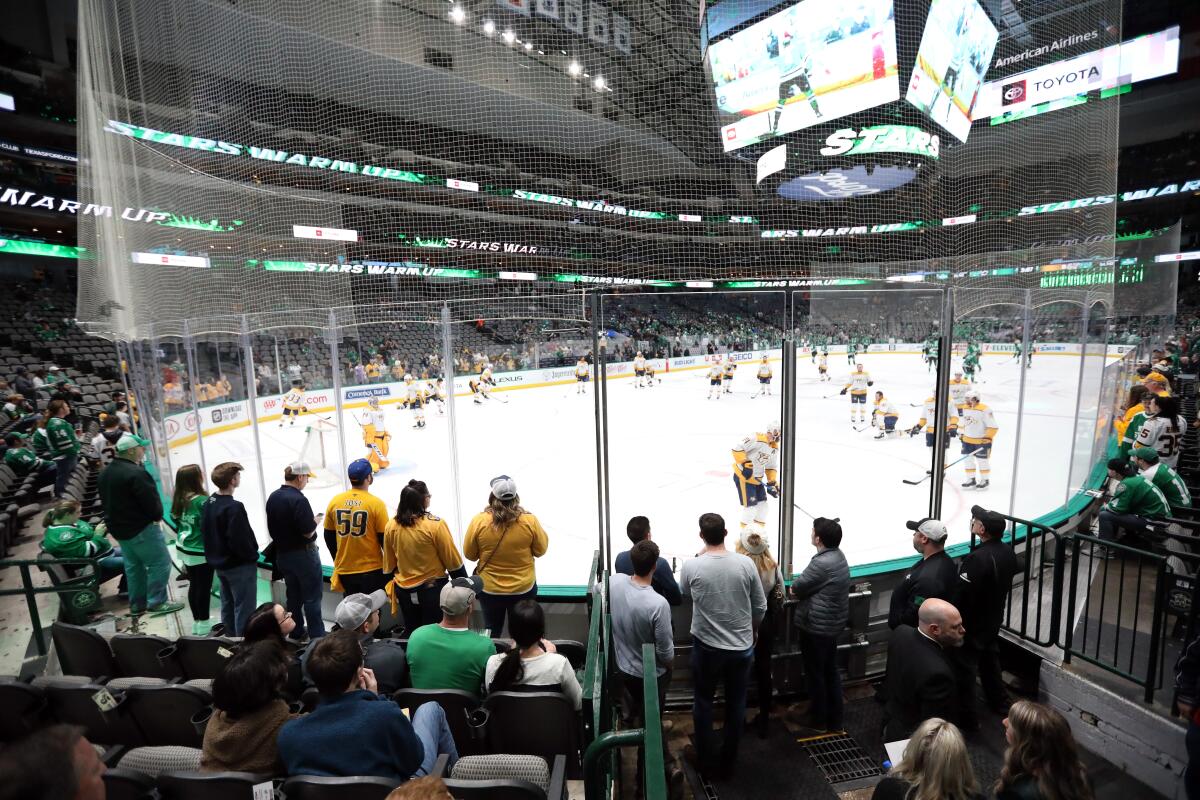
- Share via
The coronavirus outbreak has begun to impact hockey on global and local levels. The International Ice Hockey Federation announced Saturday it had canceled the women’s world hockey championships, and the NHL edged toward taking steps that could include ordering teams to play in empty arenas in an effort to avoid crowds in which the virus could spread.
“We are dealing with a rapidly evolving situation and are preparing for all contingencies,” NHL deputy commissioner Bill Daly said by email Saturday morning.
Last week, the league told employees to cancel business travel outside North America. It also advised teams to tell players to avoid close contact with fans and to skip high-fives or accepting items from fans.
Although it was reported the NHL told teams to close their locker rooms to media in order to control the spread of the virus, not every team has done so. On Saturday, the Pittsburgh Penguins and Washington Capitals opened their locker rooms after their games and the Ducks opened their room after they practiced.
The San Jose Sharks, however, kept their room closed after practice Friday and the Dallas Stars closed their locker room after their game Saturday. Those teams brought players to a designated interview area.
The Kings on Saturday closed their locker room to media “for precautionary reasons,” a club spokesman said. Goaltender Cal Petersen wore gloves while speaking to reporters in a newly designated interview area at Staples Center.
The IIHF announces it is canceling this year’s women’s hockey championships in Canada because of the coronavirus outbreak.
The IIHF cited “safety concerns for the well-being of players, officials, and spectators” in canceling the women’s world championships, which were to be played in the Canadian cities of Halifax and Truro from March 31 through April 10. The decision follows a precedent set in 2003, when the women’s tournament was canceled in response to a SARS outbreak in host country China. The U.S. women’s team has won the last five world titles.
“Ultimately the IIHF council feels that there has not been enough of an improvement to the coronavirus situation to allow us to safely host a 10-team international tournament within this time frame,” IIHF president Rene Fasel said. He added that Halifax and Truro will be given the chance host next year’s women’s world championship, pending final approval.
The status of other international hockey tournaments will be evaluated in the coming weeks, Fasel said. The men’s under-18 world championships are scheduled to be played April 16-26 in Plymouth and Ann Arbor, Mich. The men’s world championships are scheduled to be played in May in Switzerland.
A look at how sports leagues, including the NFL, MLB, NBA and NHL, are monitoring the coronavirus outbreak.
Also last week, the NHL’s Seattle expansion franchise postponed releasing season ticket prices and a seat selection process that would have brought visitors to a preview center. According to the Seattle Times, the decision was made “out of respect for concerns the team’s fans may have” over the coronavirus. The team is scheduled to begin play in 2021-22.
The situation remains fluid and it’s not far-fetched to think NHL games will be postponed or canceled. “Wash your hands. Be safe,” Dustin Brown said after recording a hat trick in the Kings’ 7-3 victory over Minnesota on Saturday. Wise words in any situation.
What wasn’t broken didn’t get fixed
The NHL always seems intent on reinventing itself. Maybe driven by a misguided desire to try to please everyone, league executives can rarely get through a season without changing a rule, tweaking another one, and generally fixing things that aren’t broken.
That’s why it was surprising to see sanity prevail when general managers met in Florida last week and made some sensible decisions.
Most notably, they voted in favor of changing the application of the offside rule to allow players to be deemed onside as long as one of a player’s skates is above the vertical plane of the blue line even if it’s not in contact with the ice. The recommendation will go to the joint NHL/NHL Players’ Assn. competition committee and from there to the Board of Governors, which has final say.
Lera Doederlein has overcome her physical limitations to become a member of the U.S. women’s national development sled hockey team and this season’s 21st Duck.
The broader interpretation is intended to lead to more goals and fewer disruptive coach’s challenges. There were 18 coach’s challenges for skate-in-the-air situations through the first 1,015 games played this season and in 14 cases goals were nullified. “It’s not a change in the rule, it’s a change in the application of the rule to not be required to have contact with the ice but for the skate to be over the blue line when the puck crosses the line,” said Kris King, the league’s senior vice president of hockey operations.
General managers also recommended no change to procedures that govern the use of emergency backup goaltenders, which produced the delightful story of 42-year-old David Ayres recording a win for Carolina at Toronto on Feb. 22. However, every emergency backup who is registered with the league’s Central Registry department will be required to undergo a physical exam before the season. There are 136 registered emergency backups this season.
Ayres, who drives the ice resurfacing machine at Toronto’s Mattamy Athletic Centre on the former site of Maple Leaf Gardens and occasionally practiced with the team, played the final 29 minutes for the Hurricanes against Toronto after in-game injuries left Petr Mrazek and James Reimer unable to play.
He made eight saves in becoming the oldest goalie in NHL history to win his regular-season debut, generating the best publicity the NHL has had in a long time as he became a sought-after guest on TV talk shows in the U.S. and Canada.
Also during the meetings, Daly said the salary cap for next season is projected to be between $84 million and $88.2 million, up from $81.5 million this season. The figure won’t be announced until June, though Daly said the league and the NHLPA have discussed possible ways to calculate the cap number sooner.
League executives also said puck and player tracking technology is in the final testing stages and will be ready for TV broadcasts of the playoffs this spring. In reality, that’s a mixed blessing. In previous experiments, the puck trails and information generated by the tracking system have cluttered the screen so much that the action is difficult to follow. It will evolve, no doubt.
More to Read
Go beyond the scoreboard
Get the latest on L.A.'s teams in the daily Sports Report newsletter.
You may occasionally receive promotional content from the Los Angeles Times.

